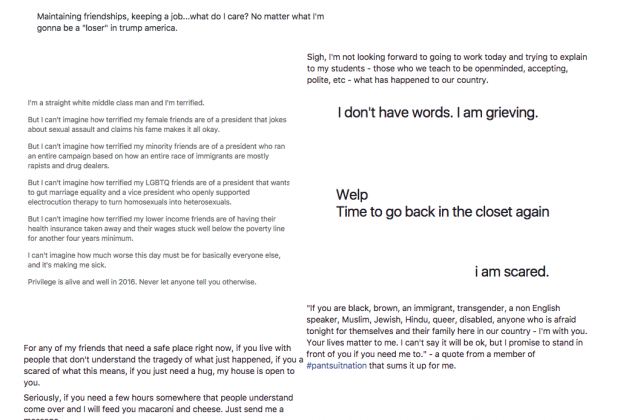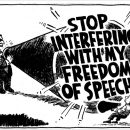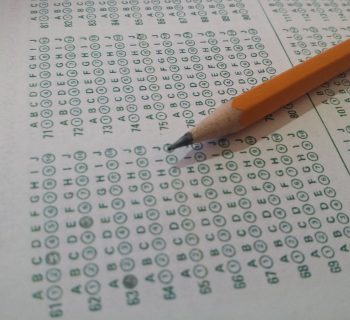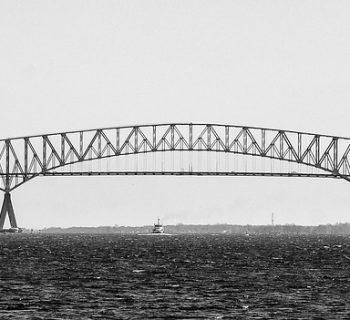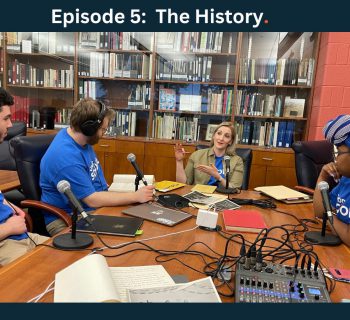*The image is a compilation of quotes from Election Night on Social Media.
Dylan Greene
*Articles reflect the views of the author and or those quoted and do not necessarily represent the views of CCBC or the CCBC Connection.
Perhaps more so than previous elections in recent memory, the placement of Election Day shortly after Halloween seems appropriate. If one emotion has been omnipresent in political discussion it has been fear. This fear does not come without reason as many frightening things have been said and done. However, there are deeper implications to this climate.
The current political context is the most polarized the nation has ever been since the Civil War, according to Pew Research. Political views can be reasonably determined in aggregate from getting an individual's opinion on a single issue, even if the relationship between those views is tenuous or nonexistent. Unlike Obama's election, which predicated itself upon themes such as “hope” and “change”, the 2016 election is a grand display of cynicism and frustration.
The cross-party dialogue is reduced to a crawl so slow that it may as well be stationary. Those who wish to stick their guns in terms of political ideology over pragmatism attempt to find solace in third-party candidates. Others have expressed a desire for an external event to save them from the situation at hand. Bumper stickers calling for a catastrophic meteor crash or some other world-ending event are now commonplace. No one really stops to examine the implications of this.
However, this is the perfect climate for high-pressure and radical groups to thrive. When the public at large is searching for an easy answer, there is the potential to be manipulated by people selling political ideologies as if they were magical cure-alls for society's ills. This can be extrapolated to its logical conclusion, the fear that is felt among the public can be used to justify putting other people in harm's way. It can be written off as just a necessary part of the steps to the utopia promised.
Shortly after the stock market collapse in 2008, there was a rise in “survivalism.” Doomsday preppers, convinced of their righteousness, began to seclude themselves and their families. They would be the survivors once the foundations of modern society had collapsed. A keen example of this was the film “Collapse”, which is an extended interview with peak oil guru Michael Ruppert. While the film itself does not necessarily side with him, he briefly enjoyed the limelight as a result. This, however, did not last, as Ruppert shot himself after his fifteen minutes of fame had passed.
That flame seems to have burned out, largely. Preppers may still be out there, but most of them have likely understood that the world has not fallen apart at the seams and have gotten back to their daily lives. This is hopefully going to be the same after this election. However, Vox Media has laid out a distinct possibility in regards to Trump specifically. They speculate that Trump is not the last candidate of his kind, as the contingencies that led to his rise to power still exist.
This of course has further implications. If the same cycle that the nation is currently in is repeated once more, there is also the possibility that this could be amplified. Given the tension that has surrounded Trump's campaign, how much further could the envelope be pushed? The nation may be able to get through 2016, but can it get through 2020?
This question was answered upon the night of the election, though perhaps it was the most ominous answer of all, “We don't know, and we don't know what the cost will be. But honestly, it doesn't bode well.” Almost immediately, social media blew up with accounts of people who were scared, mourning, in a state of shock and disbelief.
Once that initial sentiment wore off, it was replaced with a gruesome display. People began sharing stories of atrocious hate crimes committed in Trump's name. From people who revealed their racist beliefs to their minority neighbors, sexual harassment against women that was justified by Trump's previous behavior, Muslims being threatened with deportation and forced to forego their hijabs out of fears for their safety, and even elementary school children chanting “build the wall” at their Hispanic classmates. The posts go further, with all sorts of nastiness that can be directly attributed to Trump's victory.
The seeds of the next four years have already been sown. Those who have been the most impacted are beginning to form support networks with each other, since now the institutions that they placed trust within can no longer be trusted to serve their interests. This polarization will deepen and the situation will continue to escalate until a crescendo occurs. What that looks like is anyone's guess, but what can
Be known is that for most Americans in 2016, Halloween did not arrive until November 8th.
*Articles reflect the views of the author and or those quoted and do not necessarily represent the views of CCBC or the CCBC Connection.


